In theory, and despite voting being understandably limited to Qatari citizens, the Shura Council is supposed to serve the general public. But it remains to be seen if it will take the plight of migrant workers into consideration, writes Malcolm Bidali.
The Shura Council, among other things, possesses legislative authority – the power to make, amend or repeal law that affects millions of citizens, expats and migrants nationwide.
Since its inception in 1972, council members have had, to some extent, the ability to decide what freedom is to migrant workers and other factions of Qatari society, whether debating wages or crucial laws like the now scrapped Kafala system.
Now with its new powers, it will be this body that pretty much sets the stage for a migrant worker’s experience from the moment he or she lands in the Gulf state, eagerly searching for a new life, career and future.
Qatar has come too far to give in to pressure from business community
It is essential, therefore, to question whether, or how, the incoming council members – the first to be voted into public office by Qatari citizens – will respond to various demands and issues.
While we’re always cautioned not to dwell on the past, it cannot be ignored when discussing migrant workers’ welfare, especially with regards to the Shura Council in particular.
In February this year, just six months after authorities introduced significant labour reforms, the Shura Council proposed some recommendations that, frankly, posed a major threat to the progress made in Qatar.
The reforms were hailed globally as a godsend for workers but slammed by employers and big businesses as a nightmare. This backtracking by the council therefore sought only to appease private interests of those who can only be described as individuals fuelled by greed.
While they were unfortunately unable to see at the time, these major reforms actually worked in favour of employers, employees and served as a win for Qatar as a whole. The council’s recommendations were thankfully ignored by the government which refused to backtrack on the labour reforms it had introduced.
Previously-appointed council members consisted of business tycoons. However, the vote on 2 October marks a crucial crossroad for the country’s trajectory, and it’s fair to say, particularly for migrant workers, who will be hoping that those voted in are more interested in building on the gains made by authorities in recent years, rather than their personal financial gains.
Read also: Migrant rights activist Malcom Bidali reveals details of Qatar arrest
Unfortunately for workers, business owners in Qatar are well connected to those in office. In some cases, lines between business, government and family are blurred even sometimes virtually nonexistent. For this reason, the incoming council will face the challenge of navigating through these vague territories that stand between business, public office and workers rights.
With that being said, it remains to be seen whether the Shura Council, like other parliamentary and legislative bodies around the world, will have a workers rights or labour committee. If so, will this committee have an effective working relationship with the Ministry Of Administrative Development, Labour and Social Affairs, which has for years attempted to improve the conditions of workers while protecting their welfare in the country?
For the most part, the ministry has done a commendable job. However, for some reason, its authority seems to be undermined by private interests.
Despite all the reforms, workers in Qatar still struggle to get justice. From wrongful termination, wage theft, nonpayment, physical and sexual assault, job change disputes, etc – the list is endless.
In an ideal world, ADLSA would step in to act swiftly and accordingly, but from personal experience, simple observation, and extensive documentation by other parties, we see that employers generally seem untouchable.
To add to its challenges, it seems the Ministry of Interior (MOI) is yet another party complicit in undermining the ADLSA.
This has been seen across different cases, time and time again: a worker may file a complaint with ADLSA regarding nonpayment or assault. The employer can then file a bogus ‘absconding’ (‘huroob’/runaway) charge against the employee, which is then picked up by MOI at the cost of the original employee’s complaint. Sadly, this usually ends up in apprehension of the worker, detention, and ultimately deportation.
OPINION: Shura Council elections would provide Qatari citizens with a stake and voice in government affairs
In theory, and despite voting being understandably limited to Qatari citizens, the Shura Council is supposed to serve the general public. As much as I’m convinced that some of the candidates have great ideas and want to use their legislative power nobly, when the dust settles and the rhetoric ends, migrant workers will be at the mercy of these elected officials.
While hopes remain high, it is hard to be anything more than sceptical that a new Shura Council will be any different or kinder in its treatment of migrant workers.
In the battle between the welfare of migrant workers versus private interests, it is unlikely that the little guy, who has remained on the fringes of society: exploited, invisible and voiceless, will come out on top. But then again, Qatar has always positioned itself to be the exception to the rule, so there is still hope.
Malcolm Bidali is a human rights activist who frequently blogs on the plight of migrant workers in Qatar and the Gulf region.
Follow Doha News on Twitter, Instagram, Facebook and Youtube







